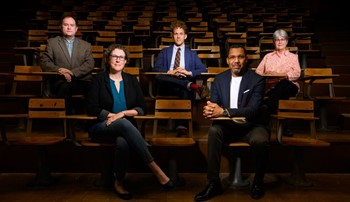Keith S. Hébert
Draughon Professor of Southern History
Professor
Co-director, Public History Program
History
Office Hours
Tuesday, Thursday 8-9 am or by appointment
In the news
Education
PhD, Auburn University
MA, Virginia Polytechnic Institute and State University (Virginia Tech)
BA, University of West Georgia
About Me
Keith S. Hébert joined the Auburn University faculty in 2014 where he directs the department's public history certificate program and offers courses in public history and southern history. His research focuses on the Confederate home front during the American Civil War and the role that white supremacy played in the development of Civil War memory. His first book, The Long Civil War in the North Georgia Mountains: Confederate Nationalism, Sectionalism, and White Supremacy in Bartow County, Georgia, was released in 2017. The Long Civil War won an "Outstanding Academic Title, 2018" award from the American Library Association.
Hébert's latest book, Cornerstone of the Confederacy: Alexander H. Stephens and the Speech that Defined the Lost Cause (2021), was published by the University of Tennessee Press. The book examines the origins and historical legacy of Stephens's infamous Cornerstone Speech and its impact on how Americans have remembered the Civil War from emancipation to the Internet Age. In 2022, Cornerstone of the Confederacy received the Malcolm Bell, Jr. and Muriel Barrow Bell Award from the Georgia Historical Society. The Bell Award, established in 1992, is the highest publication award given by the Georgia Historical Society. It recognizes the best book on Georgia history published in the previous year.
Also, Hébert's research on the Confederate home front in the Georgia Piedmont region was included as a chapter in Matthew Hild and Michael Gagnon's Gwinnett County, Georgia, and the Transformation of the American South, 1818-2018 (UGA Press, 2022). Recently, Hébert co-authored, with Hilary Green (Davidson College), a study of Reconstruction-era African American schools in the South, 1863-1900, for the Organization of American Historians and the National Park Service. This report will help NPS identify, preserve, and interpret additional historic resources associated with the long history of Black education in postbellum America.
Currently, Hébert is part of a multi-disciplinary team of scholars working to preserve the Bloody Sunday conflict site in Selma. His team is trying to identify the names and stories of the 600 plus foot soldiers who marched on March 7, 1965. He is completing two NPS and OAH projects examining African American history in the Cumberland Gap Region of central Appalachia and in northeast Florida's Timucuan Ecological and Historic Preserve near Jacksonville. Meanwhile, Hébert is working closely with Dr. Stan Angion, President of Selma University, to restore several buildings located on this HBCU's historic campus. Among those buildings is Dinkins Memorial Hall which was designed by Robert R. Taylor, the nation's first Black licensed architect and designer of much of Tuskegee University's historic campus.
Dr. Hébert is currently accepting Public History Certificate, MA, and PhD students as his advisees. Current and past graduate students have researched a variety of topics including: Civil War memory, the Confederate home front during the Civil War, historical memory of the long civil rights movement, southern community history, historic preservation, and a broad array of public history related subjects on museum interpretation, public history institutional histories, and more. Several of Dr. Hébert's advisees have found employment as tenure-track college professors, National Park Service professionals, archivists, museum interpreters and conservators, records managers, and more. Dr. Hébert works closely with his advisees to locate a diverse range of professional opportunities and training to ensure that students can build successful careers in the broad field of history both in and out of academia.
Current Major Field Advisees include:
Matthew Roberts (doctoral: Civil War emancipation history)
Laura King (doctoral: southern textile labor history)
Research Interests
Public History; Civil War and Reconstruction; U.S. South
Publications
Books
- Historic Resource Study of African American Schools in the South, 1865-1900. with Hilary Green. Washington, D.C.: National Park Service, 2022.
- Cornerstone of the Confederacy: Alexander H. Stephens and the Speech that Defined the Lost Cause. Knoxville: University of Tennessee Press, 2021. To be released April 2021.
-
Winner Malcolm Bell, Jr. and Muriel Barrow Bell Award, Georgia Historical Society
-
- The Long Civil War in the North Georgia Mountains: Confederate Nationalism, Sectionalism, and White Supremacy in Bartow County, Georgia. Knoxville: University of Tennessee Press, 2017. (Paperback edition will appear in 2021)
-
Winner of the 2019 American Library Association Choice Award for Top 75 Community College publications
-
Winner of the 2019 Outstanding Academic Award
-
- The Administrative History of Horseshoe Bend National Military Park. Washington, D.C.: National Park Service, 2019.
Articles
- "Reluctant Confederates, Steadfast Unionists, and Rebellious Slaves: Secession and Civil War in Gwinnett County, 1860-1865," in Matthew Hild and Michael Gagnon, eds. Gwinnett County, Georgia, and the Transformation of the American South, 1818-2018. University of Georgia Press: Athens, 2022.
- “The Psychedelic Assisi in the Southern Pines: Pasaquan, Visionary-Art Environments, and the National Register of Historic Places.” Celeste Guichard, ed. World Heritage and National Registers: Stewardship in Perspective. New Brunswick, NJ: Rutgers University Press, 2014.
- “The Bottomless Pit of Hell”: The Confederate Home Front in Bartow County, Georgia: 1864-1865.” John Fowler and David Parker, eds. Civil War in Georgia Sesquicentennial. Macon, GA: Mercer University Press, 2011.
- “Reconstruction-Era Violence in North Georgia: The Mossy Creek Ku Klux Klan’s Defense of Local Autonomy.” Andrew L. Slap, ed. Reconstruction in Appalachia: Collected Essays. Lexington: University of Kentucky Press, 2010.
- “The Bitter Trial of Defeat and Emancipation: Reconstruction in Bartow County, Georgia: 1865-1872,” Georgia Historical Quarterly 92 (2008), 65-92.





